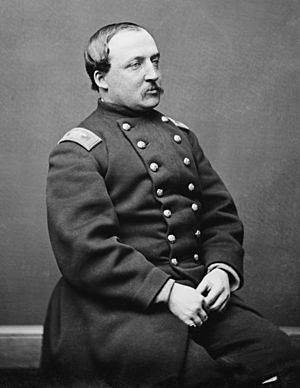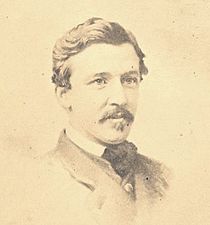William Dwight facts for kids
Quick facts for kids
William Dwight, Jr.
|
|
|---|---|

As a colonel about 1862
|
|
| Born | July 14, 1831 Springfield, Massachusetts |
| Died | April 21, 1888 (aged 56) Boston, Massachusetts |
| Place of burial |
Forest Hills Cemetery, Jamaica Plain, Massachusetts
|
| Allegiance | United States of America Union |
| Service/ |
United States Army Union Army |
| Years of service | 1861–1865 |
| Rank | |
| Commands held | 70th New York Volunteer Infantry |
| Battles/wars | American Civil War |
William Dwight, Jr. (born July 14, 1831 – died April 21, 1888) was an important general who fought for the Union Army during the American Civil War. He came from a well-known family in Massachusetts, many of whom were also military leaders.
Contents
Early Life and Education
William Dwight was born on July 14, 1831, in Springfield, Massachusetts. His family, the Dwights, was well-known in New England. He was the second of seven sons. Four of the brothers, including William, later served in the American Civil War.
As a boy, William was known for being energetic and charming. He loved spending time outdoors and playing sports. In 1846, he started attending a military school. He was then accepted into the United States Military Academy in 1849. However, he left the academy in 1853. After leaving, he moved to Boston and began working in manufacturing. On January 1, 1856, he married Anna Robeson.
Service in the Civil War
When the American Civil War began, William Dwight was moving to Philadelphia for his business. He quickly joined the Union Army. On May 14, 1861, he became a captain. He was promoted to lieutenant colonel in June 1861 and then to full colonel in July 1861.
As the leader of the 70th New York Volunteer Infantry Regiment, Dwight fought in the Battle of Williamsburg. This battle took place on May 5, 1862. He was badly wounded during the fight. His regiment also lost about half of its soldiers. William Dwight was left on the battlefield, thought to be dead. However, Confederate soldiers found him and took him as a prisoner of war. He was held until November 15, 1862, when he was released in a prisoner exchange.
Because of his bravery in battle, Dwight was promoted. He became a brigadier general of volunteers. This promotion was made official in March 1863.
Later in 1863, General Dwight was sent to the Western part of the war. There, he led his brigade in the attack on Port Hudson, Louisiana.
In early 1864, he served as a main helper to Major General Nathaniel P. Banks. This was during the Red River Campaign. He took part in battles like the Battle of Mansfield and the Battle of Pleasant Hill in Louisiana. After this, Dwight was sent back to the Eastern part of the war. He joined the 19th Army Corps. He served under General Philip Sheridan. Dwight also fought in the Valley Campaigns of 1864. He saw action at the battles of Winchester and Battle of Fisher's Hill before the war ended.
Dwight's Brothers in the War
William Dwight had several brothers who also served in the Civil War:
- His younger brother, Wilder Dwight, was born in 1833. He became a lieutenant colonel. Sadly, he died on September 19, 1862, from wounds received at the Battle of Antietam.
- Another younger brother, Howard Dwight, was born in 1837. He became a captain. He died on May 4, 1863, during the Battle of Port Hudson.
- Charles Dwight, born in 1842, left Harvard University to join the army. Charles was a lieutenant in the 70th regiment. He was taken prisoner and held in Libby Prison. He survived the war and lived until 1884.
- A distant cousin, Colonel Augustus Wade Dwight, died in 1865 during the Battle of Fort Stedman.
After the War
After the Civil War ended, William Dwight went into the railroad business. He worked in Cincinnati, Ohio, with his brother Chapman Dwight. William had one son, William Arthur Dwight, who was born in 1867.
William Dwight died on April 21, 1888, in Boston. He was buried in Forest Hills Cemetery in Jamaica Plain, Massachusetts.


